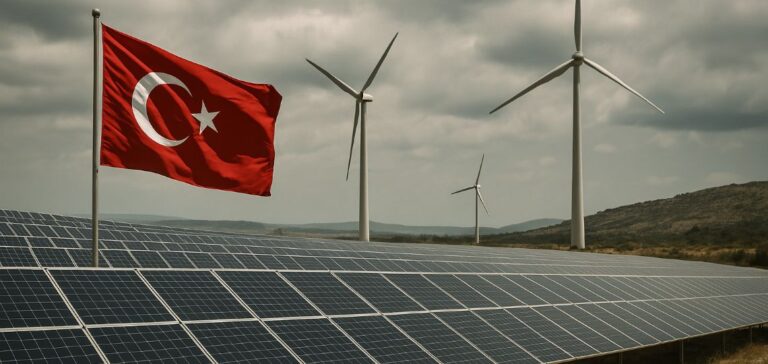Wind and solar energy represented a record 18% of electricity production in Türkiye in 2024, according to a report released by UK-based think tank Ember on 19 March. This development marks a shift for a country historically reliant on coal, natural gas and hydropower. In 2024, wind power accounted for 11% of total generation, while solar reached 7.5%, fuelled by an unprecedented annual growth of 39%, equating to an additional 7.3 terawatt hours.
Growth driven by increase in installed capacity
Since 2010, Türkiye has gradually diversified its energy sources, with wind power leading among non-hydropower renewables. Solar development accelerated more recently, driven by a national policy to expand capacity. In 2018, solar accounted for only 2.2% of the country’s electricity production. This rapid evolution forms part of a broader trend across Europe, although several European Union countries have reported even higher shares.
Romania, for instance, doubled its solar share between 2023 and 2024, reaching 7.8%, while Southern European countries such as Spain, Italy, Greece and Portugal have shares ranging from 14% to 22%. Despite having lower solar potential, Poland now generates 9% of its electricity from solar, highlighting the growth still possible for Ankara.
Continued reliance on imported coal
At the same time, Türkiye remains the most coal-dependent country in Europe for electricity generation, with a 36% share in 2024—well above the European average of 10%. That year, Türkiye generated 122 terawatt hours of electricity from coal, surpassing output from Germany (104 TWh) and Poland (91 TWh), both historically coal-producing nations.
This high level of coal usage is largely based on imports: 61% of coal used in Turkish power plants is imported, as is 96% of natural gas consumed across all sectors. This dependency increases the country’s energy vulnerability, particularly during drought periods affecting hydropower generation.
2035 target: quadrupling renewable capacity
In response to these challenges, Turkish authorities have set ambitious goals for 2035, planning to quadruple the country’s installed wind and solar capacity. If achieved, Ember projects that wind and solar could account for 49% of the energy mix, while fossil fuel generation could fall below 20%.
Such a transition would significantly reduce Türkiye’s dependence on energy imports while enhancing its resilience to climate-induced hydropower variability.






















